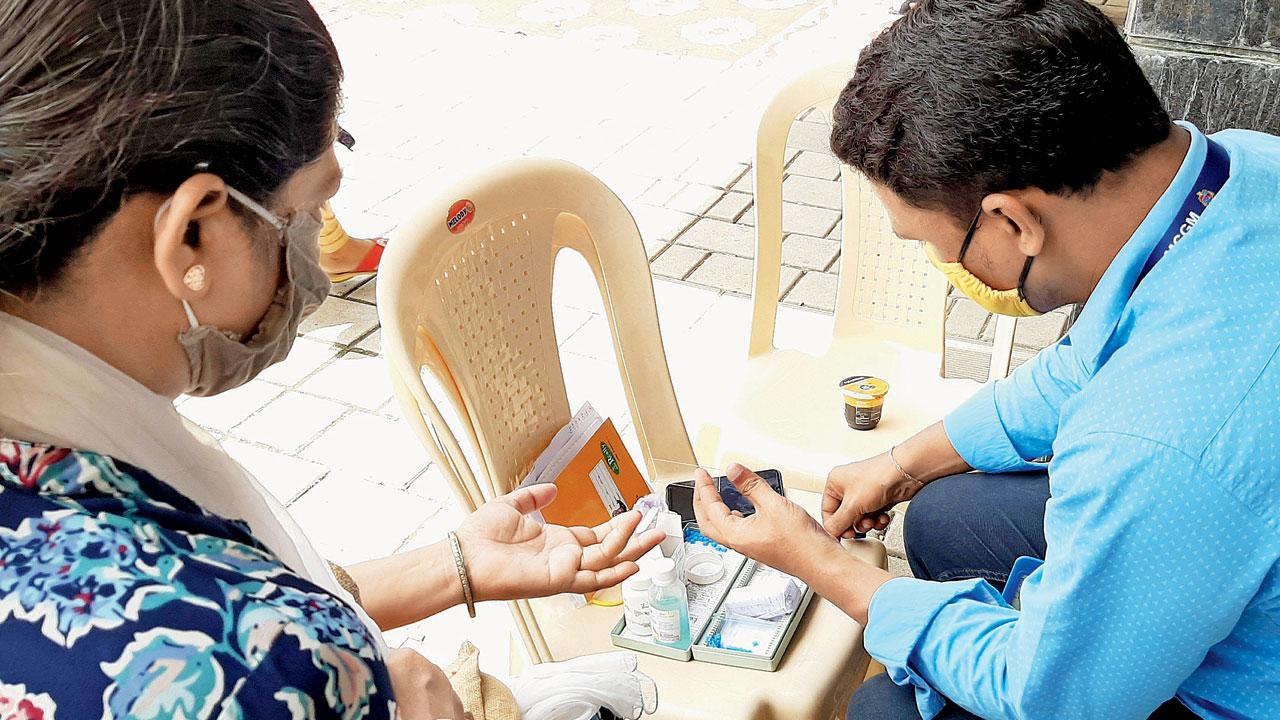Intermittent rain provides favourable conditions for the breeding of mosquitoes behind the diseases, warn experts; in the past four days there have been 89 cases of malaria and 29 of dengue

A woman is tested for malaria and dengue at Kandivli in 2020. Pic/Satej Shinde
After swine flu, now dengue and malaria cases are on the rise in Mumbai. In the past four days, the city has been reporting 22 cases of malaria and 7 cases of dengue every day. Hence in the past four days, 89 patients have been diagnosed with malaria and 29 patients have been diagnosed with dengue. Experts caution that intermittent rain as now provides favourable environment for mosquito breeding, and so there is a high chance of an increase in the cases of vector-borne diseases.
ADVERTISEMENT
Dr Vasant Nagvekar, co-director, Infectious Diseases at Sir HN Reliance Foundation Hospital, said, “I have seen multiple cases of dengue. Very few patients needed hospitalisation. Intermittent rain provides a favourable environment for mosquitoes to breed. So anyone with fever for more than 4 to 5 days must go for a test.” However, experts said there has been a drop in swine flu cases in the past 2 weeks. In the past four days, only 3 cases of swine flu have been reported.
Also read: Is someone lying about swine flu numbers in Mumbai?
BMC Executive Health Officer Dr Mangala Gomare said, “Compared to last year, cases of malaria and dengue are on the lower side. But we may see a rise in cases in September and October because of intermittent rain. Scrap and other material where water accumulates, provide a favourable site for mosquito breeding. So we have to maintain cleanliness. Swine flu cases have gone down in the past few days. Masking and self-hygiene should continue.”
As per BMC officials, most of the cases of dengue and malaria have been reported from B, F South, G North, D, and E wards. Dr Hemlata Arora, senior consultant, Infectious Disease and Internal Medicine, Nanavati Hospital said, “From the beginning of September till October we will see a spike in dengue and malaria cases. Before COVID-19 there were fewer malaria cases and more dengue cases, but this time cases of both are quite high.”
Advisory for prevention of vector-borne diseases
>> To prevent breeding of Aedes mosquitoes, which are day biters, workplace and surroundings must be kept clean. Mosquito larvae live in still water. They require minimal amount of water, and even something as small as a puddle on a discarded plastic bag can house them. Articles such as tins, thermocol boxes, coconut shells, tyres lying around must be removed.
>> Those with a fever, headache, rashes, muscle and joint pain, vomiting, or diarrhea must consult a doctor.
>> Avoid self-medication and consult your nearest BMC health post/dispensary/hospital. It is important not to delay treatment as it can lead to complications and even death.
 Subscribe today by clicking the link and stay updated with the latest news!" Click here!
Subscribe today by clicking the link and stay updated with the latest news!" Click here!







